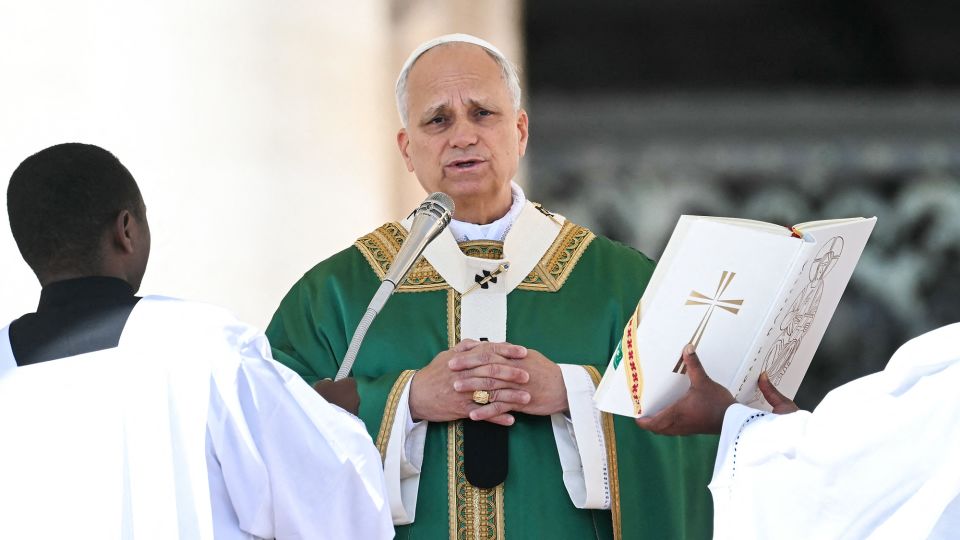Pope Leo XIV, writing in the first major document of his pontificate, has denounced the “dictatorship” of economic inequality while insisting the Catholic Church is committed to supporting “rejected” migrants.
Leo’s almost 40-page text, released on Thursday, focuses on poverty, emphasizing the Catholic Church’s long commitment to the socially disadvantaged while offering a strong critique of the global economic system.
The first American pope calls on Catholics to work on eradicating “unjust” economic structures, insisting that concern for the poor is non-negotiable. Leo also criticizes those in the church who simply want to teach “sound doctrine” and even “ridicule” charitable works.
“We need to be increasingly committed to resolving the structural causes of poverty,” Leo writes in an “Apostolic Exhortation” titled “Dilexi te” (“I have loved you”).
“Unjust structures need to be recognized and eradicated by the force of good, by changing mindsets but also, with the help of science and technology, by developing effective policies for societal change,” he writes.
An exhortation is a high-level papal document and is normally an appeal to Catholics centered on a specific theme. Leo explains that “Dilexi te” was being prepared by Pope Francis in the final months of his life, but that he was “happy to make this document my own.”
Leo’s exhortation regularly quotes Francis, including his concerns about inequality, which he said leads to an “economy that kills,” along with “trickle-down” economics. While the late pope’s critique of the global economic system saw him face criticism from some Catholics in the United States, Leo has shown he shares his predecessor’s concerns.
He criticizes “pseudo-scientific data” that argues “a free market economy” will lift people out of poverty, or that it is the government’s responsibility to deal with the problem.
And Leo warns against a “worldliness” inside the church which suggests working with the “elite” to find solutions in exchange for the church receiving privileges and security.
“We must continue, then, to denounce the ‘dictatorship of an economy that kills,’” Leo writes.
“There is no shortage of theories attempting to justify the present state of affairs or to explain that economic thinking requires us to wait for invisible market forces to resolve everything. Nevertheless, the dignity of every human person must be respected today, not tomorrow, and the extreme poverty of all those to whom this dignity is denied should constantly weigh upon our consciences.”
Concern for the poor, Leo explains, includes support for migrants, which he says is supported by scripture and includes “refugee reception centers, border missions” and is defined by efforts to “welcome, promote, protect and integrate” new arrivals to a country.
“Where the world sees threats, she (the church) sees children; where walls are built, she builds bridges,” Leo explains.
“She (the church) knows that her proclamation of the Gospel is credible only when it is translated into gestures of closeness and welcome. And she knows that in every rejected migrant, it is Christ himself who knocks at the door of the community.”
The Chicago-born pope also cites a telling historical example, pointing to the work of Saint Frances Xavier Cabrini, an Italian-American religious sister who died in 1917 and is the first US citizen to be declared a saint.
Leo references her work assisting poor Italian immigrants arriving in the US at the end of the 19th and early 20th centuries and, quoting John Paul II, remarks that these newcomers were “often victims of the unscrupulous.” Cabrini, who founded schools, hospitals and orphanages, was declared “Patroness of All Migrants” in 1950 by Pope Pius XII.
While Leo has adopted a more low-key and reserved style than his predecessor, he has voiced his concern about what he called the “inhuman treatment of immigrants in the United States” and is now facing criticism from the same quarters as Francis.
In a sign of continuity with his predecessor, Leo signed the text on poverty on October 4, the feast of Saint Francis of Assisi, the late pope’s namesake.
On the same day his exhortation was released, Leo met with Labor leaders from Chicago and expressed his appreciation for their “welcome of immigrants and refugees.” The Vatican also released his message to a gathering of the Catholic Charities USA Network in Puerto Rico, where he described migrants as “missionaries of hope.”
The day before his exhortation was published, Leo met Bishop Mark Seitz of El Paso, Texas, a prominent advocate for refugees in the US, telling Seitz the church “cannot be silent” on the plight of immigrants.
He encouraged them to help the “newly arrived brothers and sisters to be living witnesses of hope, recognizing that they have an intrinsic human dignity and are invited to participate fully in community life.”
In his document, Leo insists on a “preferential option for the poor,” citing the contribution of the Catholic Church in Latin and Central America to social justice, to which he says, as a former missionary in Peru, he is “greatly indebted.”
For more CNN news and newsletters create an account at CNN.com

